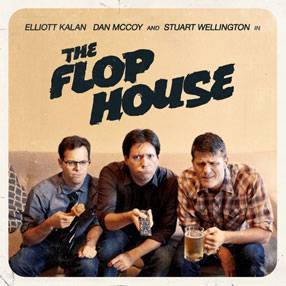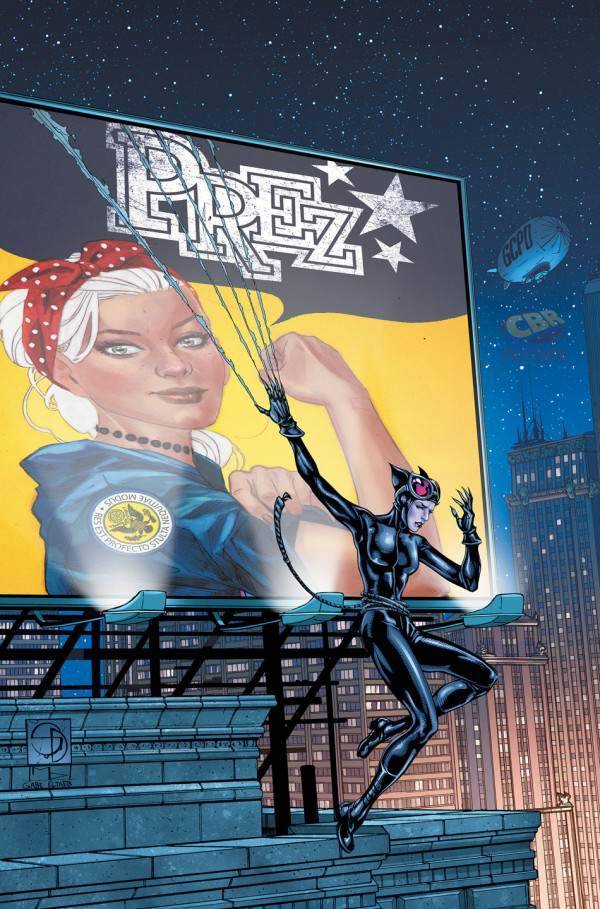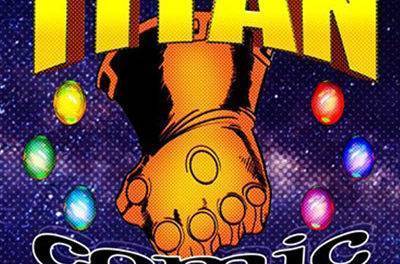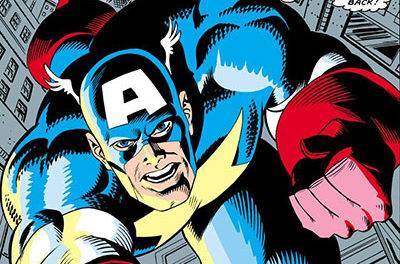 Welcome to a new installment of Between the Balloons! Chances are, if you read this column, you listen to podcasts. If you listen a podcast about comic books, you are into other pop culture podcasts. My guests this week were the three people behind The Flop House, a bad movie podcast that is going on its 10th year and currently part of the Maximum Fun network. They all stay busy outside of podcasting. Dan McCoy is a writer, most known for his work on The Daily Show. Elliott Kalan is a current writer on the upcoming relaunch of Mystery Science Theater 300. Stuart Wellington spends his time owning and operating Hinterlands, a bar in Brooklyn. If you’d like to know more, head on over to www.flophousepodcast.com after this article.
Welcome to a new installment of Between the Balloons! Chances are, if you read this column, you listen to podcasts. If you listen a podcast about comic books, you are into other pop culture podcasts. My guests this week were the three people behind The Flop House, a bad movie podcast that is going on its 10th year and currently part of the Maximum Fun network. They all stay busy outside of podcasting. Dan McCoy is a writer, most known for his work on The Daily Show. Elliott Kalan is a current writer on the upcoming relaunch of Mystery Science Theater 300. Stuart Wellington spends his time owning and operating Hinterlands, a bar in Brooklyn. If you’d like to know more, head on over to www.flophousepodcast.com after this article.
The three collaborators are currently writing a digital-only comic about The Flop House and donating all proceeds to the ACLU.
Ryan Mount for Two-Headed Nerd: What is the worst/your least favorite comic book movie of all time?
DAN: I feel like it’s hard to name a definitive worst, but Howard the Duck has to be a contender. It misses all of the satire that made the original comic so distinct and interesting, but it retains just enough adult content that it’s not clear who it’s made for. Like, no grown up would want to see it, but no kid should see a movie that has Howard lusting after Lea Thompson with a tiny duck condom, and a shot of a topless duck woman.
STUART: I remember being so bummed out by From Hell. Alan Moore and Eddie Campbell’s comic is an unfilmable phone book stuffed with mysticism, history, geography and beautiful black and white art. The movie borrows a few elements of the story and the title from the book. That’s about all. I mean, Johnny Depp’s character is literally a combination of two characters from the book (and history), a detective and a fake psychic, but the movie made him ACTUALLY psychic. Why bother adapting the comic?
THN: If not mentioned, have any one of you watched Marvel’s 2005 Man-Thing movie? It’s basically a low budget horror movie where the filmmakers seemed put Man-Thing in as the killer at the last minute. It’s definitely a Good Bad movie in my opinion, and I figured that if anyone else saw it, it might be you three.
DAN: I’ve never seen it.
ELLIOTT: I haven’t seen it, but only because I don’t want to see Man-Thing done wrong because I love that character. If you can love a character who doesn’t talk, has no discernible personality, and just lumbers around burning scared people with his touch even if they’re not bad people but just understandably scared because a lumbering swamp monster is trying to touch them.
THN: Just for fun, who/what were some of your favorite creators or comics growing up?
DAN: I was a lot more into newspaper strips growing up. Walt Kelly’s “Pogo,” Al Capp’s “Li’l Abner,” George Herriman’s “Krazy Kat,” E.C. Segar’s “Popeye” (or “Thimble Theatre”), Charles Schultz’s “Peanuts,” and, more modern, Bill Watterson’s “Calvin and Hobbes.” In comics, I tended toward the alternative scene with folks like Dan Clowes and Peter Bagge. But my favorite all-time comic book artist and writer was probably Carl Barks, who invented Uncle Scrooge and did a bunch of comedic adventure stories with him and Donald. They don’t get as much respect in the States, but in Europe duck comics are still huge today.
ELLIOTT: I was a big Marvel Zombie growing up, and pretty much still am. I’d read just about any Spider-Man or X-Men comic, regardless of quality! But the books I really came to love were Hellboy, Madman, Evan Dorkin’s Dork series, and above all Mike Baron and Steve Rude’s Nexus, which is still my favorite series. Although I’ll still read anything with Spider-Man in it.
STUART: I started with Marvel books too. In the early 90’s I was reading a ton of X-Men and Spider-Man comics. I was mainly drawn to the artists, I didn’t pay much attention to the writers. Some early favorites were Erik Larsen and Art Adams. In high school, I moved on to independent comics like Evan Dorkin’s Milk & Cheese or Dave Sim’s Cerebus. I really got into stuff where artists would write and draw everything.
THN: Did any of them have an influence on how you write comics now?
DAN: Well, the comic I wrote for our project was very consciously influenced by the E.C. Comics stories from the books Tales from the Crypt, The Vault of Horror, and The Haunt of Fear. Simple, ironic morality stories with a hint of self-parody. I just jacked up the amount of self-parody in my version.
ELLIOTT: Probably! I’m definitely of the old-school “pack as much stuff into a story” mindset, as opposed to the “decompress one story into six issues of conversation” mindset.
THN: This isn’t your first work in comics. Elliott, you did some work with Marvel. How did that work come together?
ELLIOTT: Through a fluke. My friend and fellow comic fan Wyatt Cenac was writing a short story for a Marvel anthology book and introduced me to his editor, Tom Brennan, who bought a story from me about the Inuit tribe that worshiped Captain America when he was trapped in a block of ice. Tom became a real champion for me at Marvel and that got me the chance to write more stories for them and eventually a Wolverine Annual and the Spider-Man & The X-Men series, which was a huge dream of mine. I got to write six issues of just madcap Spidey adventures, which was amazing. I can die satisfied now that I got to write a Sauron/Stegron team-up story.
THN: All Three of you are credited as writers of Flash Gordon Holiday Special over at Dynamite. In relation to Flash Gordon, is that the ultimate Good Bad movie?
DAN: I think Flash Gordon the movie is largely successful at what it’s trying to do, in that it’s aiming for a campy tone, rather than being inadvertently bad. That being said, I wouldn’t say it’s necessarily the greatest adaptation of the comics.
ELLIOTT: In that the comics were not meant to be campy at all.
THN: When you all sat down to write Flash Gordon, were there any differences between that process and when two of you worked in the writers’ room together or when all three of you podcast together?
DAN: When we do the podcast it’s clearly all very collaborative, since it’s just the three of us sitting around riffing. Doing The Daily Show was collaborative about half the time, with some writing done in pairs and some alone. Flash Gordon was pretty much just done alone. As with the comedy PowerPoint presentations we do before our live shows, I think we kind of enjoy surprising each other with what we’ve written. Maybe we gave each other a few notes on one another’s scripts; I can’t remember.
ELLIOTT: I prefer not to let these guys’ input sully my masterful, brilliant, beautiful comics stories.
STUART: I’m sure that my script went through the most revisions. It was my first attempt at a professional comics script, and it had been years since I’d done any writing.
THN: Was it any different writing this time around writing The Flop House comic?
ELLIOTT: Writing our individual stories was still a solo endeavor, but writing the introductory pages, where we each introduce our story (as Dan does for Cosmic Bowl), was a little more collaborative. I think we all wanted to make sure our individual voices felt natural. But if it makes it sound more dramatic, you can imagine we were all in one room pacing while we took turns at the computer. And maybe one of us was sitting at a piano, too. Oh, and also there were empty Chinese food containers lying around because we were gonna stick at this even if it took us ALL NIGHT!
STUART: I remember when we first talked about story ideas, Elliott and I had a ton of ideas for short stories, most pretty unfinished. Dan sat at the table quietly, before warning us that his ideas were probably terrible. Then he’d go over some super funny and well-thought-out script pitch with us. His first pitch for Cosmic Bowl was basically what you’ll see in the finished product. What I’m trying to say is, Dan is a real professional.
THN: With so much going on in the world, there are a lot of people rallying towards great organizations like the ACLU. Some podcasters offered to do extra podcasts for donations. Where did the idea of making a comic book and donating the proceeds to the ACLU come from? In simpler terms: why comics?
DAN: The idea all came from our editor Nate Cosby, actually. He had worked with us on the Flash Gordon comic, and he approached us with the idea of doing something that was part of the Flop House brand, rather than for some outside company; and he knew that we liked donating to charity, so he suggested that aspect as well. It’s nice for us, because we get to help people, and also more different types of people might end up reading the comic than would otherwise.
THN: Without giving away any spoilers, what can you tell us about the upcoming series?
ELLIOTT: We’ll each be contributing individual stories on a single theme. So for the first three stories, it’s our different takes on horror. Dan’s is EC style, Stuart’s is a more fantasy-world thing, and mine is in the slasher mode. And then in theory we’ll pick another type of story and then all do our versions of that. It could be anything! Romance! Western! Medical Dramas! Farm Stories! Polar Bear Tales!
STUART: Mine will probably be all horror comedies regardless.
THN: Who are the artists working on the book?
DAN: Roger Langridge did the interior art/color/letters – you might know him as the artist from the Muppets comic book. Tom Fowler did the cover art. We worked with him on Flash Gordon, and he also did the art for a poster we sell for suicide prevention. As for the rest — Nathan Fairbairn: Cover Color, Chris Eliopoulos: Cover Text Design, and Travis Lanham: Credits Page and Formatting.
ELLIOTT: Each story will have different artists involved, all of them way way way higher caliber than we deserve to be working with. Javier Pulido did a cover for my story that I’m absolutely in love with.
STUART: Our editor keeps promising that Erik Larsen will be doing a cover for my story, but I don’t believe him.
THN: Stuart and Dan – Did you have to keep Elliott away from lettering the book so it didn’t turn into a 5-minute song for each word balloon (love the songs btw)?
DAN: He’s actually tied up in my basement right now. It’s weird that I have the world’s only New York apartment with a basement, but there you go.
ELLIOTT: Dan, your neighbors have been complaining about all the singing in the basement.
THN: Where can folks download the comic?
DAN: https://www.flophousepodcast.com/downloads/cosmic-bowl/. You can get it in all the common digital comics formats, PDF, CBR or CBZ.
THN: Why the ACLU?
ELLIOTT: We’re all pretty hardcore free speech and equal rights folks, as well as patriots dismayed at the present state of the government, and the ACLU has been such an effective organization in pushing back on the recent horriblenesses of the current administration. At some point those jerks are going to come for the bad movie podcasts, and then that investment in the ACLU is going to pay off big time!
THN: I want to thank all three of you for the entertainment and your generosity. The Flop House is a comedy podcast, and yet you take time to really help a lot of folks out with your support of suicide prevention causes and the ACLU. What leads you to rally behind causes when others would rather you simply “stay in the comedy lane?”
STUART: We like to help people, dude!
DAN: I can’t speak for the others, but I personally come to it out of a feeling of “not doing enough.” I know there are many people who take solace in the humor and feeling of friendship the podcast provides, and there are certainly people who are comforted by my day job at The Daily Show, but when it comes down to “am I doing enough to directly contribute to the good in the world?” I’m not necessarily sure where I fall on that score. We’ve all been so exceptionally privileged in different ways, it’s important to give something back.
And, with regards to suicide prevention – a lot of that actually came from the Facebook group, when I made a comment about wanting to do something for charity, (inspired by all the great work the McElroy Brothers have done with their podcast) and the Facebook group took up the mantle. We sort of partnered with those fans online to turn it into a contest where people could donate to the American Foundation for Suicide Prevention, and they would be entered to win the chance to pick a movie for us to talk about on the podcast.
Severe depression is an issue that I’ve struggled with, and I know many of our listeners have struggled with, so that kind of arose organically that we’d be involved in that.
ELLIOTT: The amount of pushback has actually been extremely minimal, which either means we aren’t really doing enough to help others or our fans are just really great people. Probably both! But thank you! We are extremely lucky to be able to do any of this.
THN: Thank you all for taking time out and for the work you do.
If you want more of the Flophouse, go on over to www.flophousepodcast.com. Follow them on twitter at @theflophousepod, @dankmccoy, @ElliottKalan, and @flophousecat. And make sure to go and download a copy of The Flop House comic!



